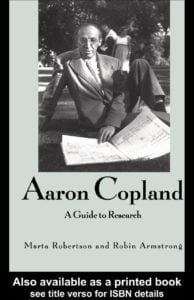Four Piano Blues Aaron Copland with sheet music
No. 1
No. 2
No. 3
provider: dailymotion
url: https://dai.ly/k4PuHOa2xkoFd5xIv58
src: https://geo.dailymotion.com/player.html?video=x88move&
src mod: https://geo.dailymotion.com/player.html?video=x88move
src gen: https://geo.dailymotion.com/player.html?video=k4PuHOa2xkoFd5xIv58
No. 4 Copland – Four Piano Blues No.4 (with sheet music)

Download Copland’s sheet music from our Library.
Aaron Copland
Aaron Copland (November 14, 1900 – December 2, 1990) was an American composer, composition teacher, writer, and later a conductor of his own and other American music. Copland was referred to by his peers and critics as “the Dean of American Composers”. The open, slowly changing harmonies in much of his music are typical of what many people consider to be the sound of American music, evoking the vast American landscape and pioneer spirit.
He is best known for the works he wrote in the 1930s and 1940s in a deliberately accessible style often referred to as “populist” and which the composer labeled his “vernacular” style. Works in this vein include the ballets Appalachian Spring, Billy the Kid and Rodeo, his Fanfare for the Common Man and Third Symphony. In addition to his ballets and orchestral works, he produced music in many other genres, including chamber music, vocal works, opera and film scores.
After some initial studies with composer Rubin Goldmark, Copland traveled to Paris, where he first studied with Isidor Philipp and Paul Vidal, then with noted pedagogue Nadia Boulanger. He studied three years with Boulanger, whose eclectic approach to music inspired his own broad taste. Determined upon his return to the U.S. to make his way as a full-time composer, Copland gave lecture-recitals, wrote works on commission and did some teaching and writing.
However, he found that composing orchestral music in the modernist style, which he had adopted while studying abroad, was a financially contradictory approach, particularly in light of the Great Depression. He shifted in the mid-1930s to a more accessible musical style which mirrored the German idea of Gebrauchsmusik (“music for use”), music that could serve utilitarian and artistic purposes. During the Depression years, he traveled extensively to Europe, Africa, and Mexico, formed an important friendship with Mexican composer Carlos Chávez and began composing his signature works.
During the late 1940s, Copland became aware that Stravinsky and other fellow composers had begun to study Arnold Schoenberg‘s use of twelve-tone (serial) techniques. After he had been exposed to the works of French composer Pierre Boulez, he incorporated serial techniques into his Piano Quartet (1950), Piano Fantasy (1957), Connotations for orchestra (1961) and Inscape for orchestra (1967).
Unlike Schoenberg, Copland used his tone rows in much the same fashion as his tonal material—as sources for melodies and harmonies, rather than as complete statements in their own right, except for crucial events from a structural point of view. From the 1960s onward, Copland’s activities turned more from composing to conducting. He became a frequent guest conductor of orchestras in the U.S. and the UK and made a series of recordings of his music, primarily for Columbia Records.
Legacy
Copland wrote a total of about 100 works which covered a diverse range of genres. Many of these compositions, especially orchestral pieces, have remained part of the standard American repertoire. According to Pollack, Copland “had perhaps the most distinctive and identifiable musical voice produced by this country so far, an individuality … that helped define for many what American concert music sounds like at its most characteristic and that exerted enormous influence on multitudes of contemporaries and successors.”
His synthesis of influences and inclinations helped create the “Americanism” of his music. The composer himself pointed out, in summarizing the American character of his music, “the optimistic tone”, “his love of rather large canvases”, “a certain directness in expression of sentiment”, and “a certain songfulness”.
While “Copland’s musical rhetoric has become iconic” and “has functioned as a mirror of America,” conductor Leon Botstein suggests that the composer “helped define the modern consciousness of America’s ideals, character and sense of place. The notion that his music played not a subsidiary but a central role in the shaping of the national consciousness makes Copland uniquely interesting, for the historian as well as the musician.” Composer Ned Rorem states, “Aaron stressed simplicity: Remove, remove, remove what isn’t needed…. Aaron brought leanness to America, which set the tone for our musical language throughout [World War II]. Thanks to Aaron, American music came into its own.”
